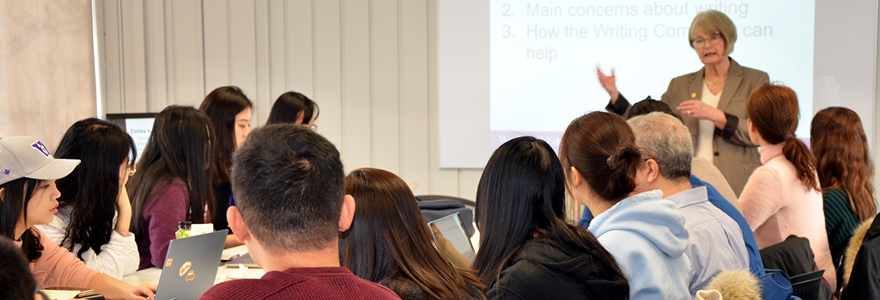
Grace Howell discusses the latest version of the APA style guide during a Writing Commons’ lunch and learn session.

Grace Howell discusses the latest version of the APA style guide during a Writing Commons’ lunch and learn session.
Graduate students aren't alone in their academic journey. No matter where they are in their studies, or where they live, they have a unique community within the Faculty of Education to help them.
Welcome to the Writing Commons - a space where students receive writing support through interpreting feedback, generating and organizing ideas, developing papers, understanding genres, and revising instructor work.
This service is student led. Graduate students can get a half-hour or hour appointment in-person or they can drop-in to ask questions. What's more, this year the program expanded to include help either online or over the phone.
"I heard from students nationally and around the globe," said Writing Commons coordinator and PhD student Jill Dombroski. "I also helped students with power point and in-class presentations, and I encouraged a social presence with learning sessions over lunch hours."
Developing fellowship among graduate students has been an important feature that's been added to the Writing Commons this year. As a graduate student, Dombroski heard classmates talk about feeling isolated while working on their research and how they wanted more activities.
"With everyone at different spots in the program, I decided I needed to save the lunch hour free for people to drop in," said Dombroski. "Once a month I had guest speakers share information while we had a lunch provided by the Graduate Office."
Christopher Eaton started the Writing Commons at the beginning of his PhD studies. He recognized many graduate students struggled with writing, interpreting feedback and adjusting to the different genres in their programs.
"There were few resources to help them through these struggles so I decided to tailor my PhD funding work towards creating a space where students could receive writing support," said Eaton.
This year, Dombroski succeeded Eaton as the Writing Commons coordinator. Both brought different strengths to the position. Eaton has a strong writing background while Dombroski excels at developing relationships and creating a community of writers.
With the Writing Commons' success, they've decided to write a paper about their experiences and the lessons they learned about writing support and how it can benefit faculties, said Eaton.
Dombroski added their paper can also show the relationship between the importance of community and student wellness.
They were scheduled to present their research at the Canadian Writing Centres Association conference in June. However, the conference has been cancelled due to COVID-19. Instead, they will continue to develop ideas for next year's conference.
"My hope is the paper can accentuate the need for writing support for faculties, which is a glaring need at the graduate level," said Eaton. "Having resources, even relatively inexpensive ones like the Writing Commons, can yield huge dividends for faculties, supervisors, and students alike."